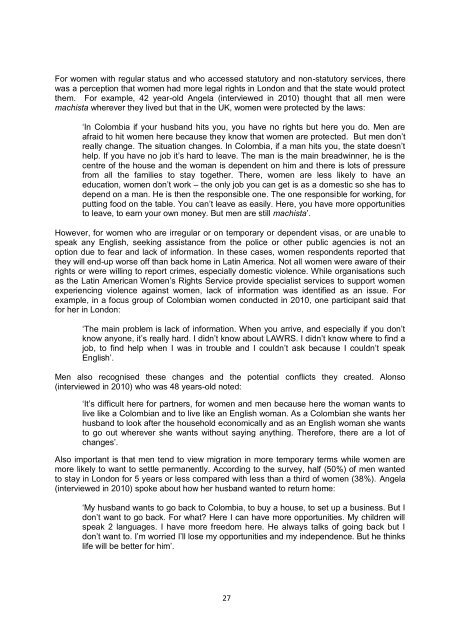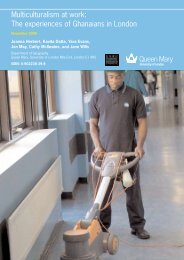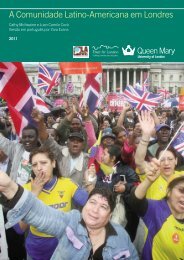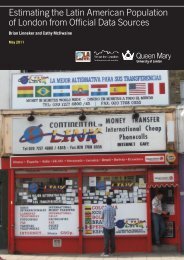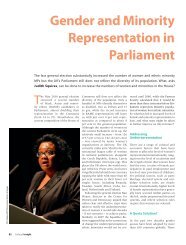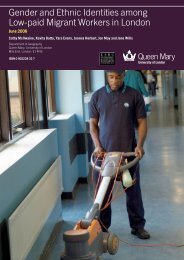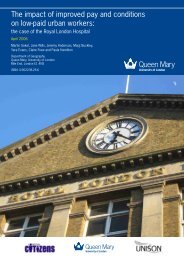The Colombian community in London - Geography - Queen Mary ...
The Colombian community in London - Geography - Queen Mary ...
The Colombian community in London - Geography - Queen Mary ...
- No tags were found...
You also want an ePaper? Increase the reach of your titles
YUMPU automatically turns print PDFs into web optimized ePapers that Google loves.
For women with regular status and who accessed statutory and non-statutory services, there<br />
was a perception that women had more legal rights <strong>in</strong> <strong>London</strong> and that the state would protect<br />
them. For example, 42 year-old Angela (<strong>in</strong>terviewed <strong>in</strong> 2010) thought that all men were<br />
machista wherever they lived but that <strong>in</strong> the UK, women were protected by the laws:<br />
„In Colombia if your husband hits you, you have no rights but here you do. Men are<br />
afraid to hit women here because they know that women are protected. But men don‟t<br />
really change. <strong>The</strong> situation changes. In Colombia, if a man hits you, the state doesn‟t<br />
help. If you have no job it‟s hard to leave. <strong>The</strong> man is the ma<strong>in</strong> breadw<strong>in</strong>ner, he is the<br />
centre of the house and the woman is dependent on him and there is lots of pressure<br />
from all the families to stay together. <strong>The</strong>re, women are less likely to have an<br />
education, women don‟t work – the only job you can get is as a domestic so she has to<br />
depend on a man. He is then the responsible one. <strong>The</strong> one responsible for work<strong>in</strong>g, for<br />
putt<strong>in</strong>g food on the table. You can‟t leave as easily. Here, you have more opportunities<br />
to leave, to earn your own money. But men are still machista‟.<br />
However, for women who are irregular or on temporary or dependent visas, or are unable to<br />
speak any English, seek<strong>in</strong>g assistance from the police or other public agencies is not an<br />
option due to fear and lack of <strong>in</strong>formation. In these cases, women respondents reported that<br />
they will end-up worse off than back home <strong>in</strong> Lat<strong>in</strong> America. Not all women were aware of their<br />
rights or were will<strong>in</strong>g to report crimes, especially domestic violence. While organisations such<br />
as the Lat<strong>in</strong> American Women‟s Rights Service provide specialist services to support women<br />
experienc<strong>in</strong>g violence aga<strong>in</strong>st women, lack of <strong>in</strong>formation was identified as an issue. For<br />
example, <strong>in</strong> a focus group of <strong>Colombian</strong> women conducted <strong>in</strong> 2010, one participant said that<br />
for her <strong>in</strong> <strong>London</strong>:<br />
„<strong>The</strong> ma<strong>in</strong> problem is lack of <strong>in</strong>formation. When you arrive, and especially if you don‟t<br />
know anyone, it‟s really hard. I didn‟t know about LAWRS. I didn‟t know where to f<strong>in</strong>d a<br />
job, to f<strong>in</strong>d help when I was <strong>in</strong> trouble and I couldn‟t ask because I couldn‟t speak<br />
English‟.<br />
Men also recognised these changes and the potential conflicts they created. Alonso<br />
(<strong>in</strong>terviewed <strong>in</strong> 2010) who was 48 years-old noted:<br />
„It‟s difficult here for partners, for women and men because here the woman wants to<br />
live like a <strong>Colombian</strong> and to live like an English woman. As a <strong>Colombian</strong> she wants her<br />
husband to look after the household economically and as an English woman she wants<br />
to go out wherever she wants without say<strong>in</strong>g anyth<strong>in</strong>g. <strong>The</strong>refore, there are a lot of<br />
changes‟.<br />
Also important is that men tend to view migration <strong>in</strong> more temporary terms while women are<br />
more likely to want to settle permanently. Accord<strong>in</strong>g to the survey, half (50%) of men wanted<br />
to stay <strong>in</strong> <strong>London</strong> for 5 years or less compared with less than a third of women (38%). Angela<br />
(<strong>in</strong>terviewed <strong>in</strong> 2010) spoke about how her husband wanted to return home:<br />
„My husband wants to go back to Colombia, to buy a house, to set up a bus<strong>in</strong>ess. But I<br />
don‟t want to go back. For what Here I can have more opportunities. My children will<br />
speak 2 languages. I have more freedom here. He always talks of go<strong>in</strong>g back but I<br />
don‟t want to. I‟m worried I‟ll lose my opportunities and my <strong>in</strong>dependence. But he th<strong>in</strong>ks<br />
life will be better for him‟.<br />
27


